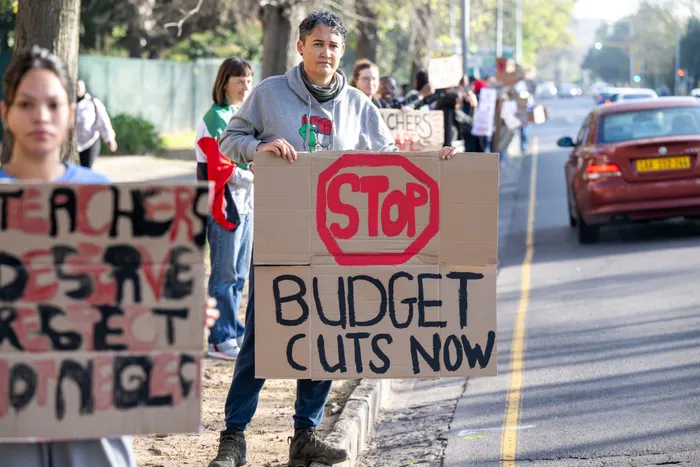Western Cape warned cutting teachers could compromise education

The Western Cape Education Department is under pressure to stop the decision to cut more than 2 400 teacher posts when their contracts expire by the end of the year. Picture: Henk Kruger/Independent Newspapers
It was “truly shocking” that a choice to cut teachers would ever be considered by any education department, says an education expert.
Stellenbosch University’s Education Policy Studies lecturer, Dr Elzahn Rinquest, has suggested that cuts that are to be made should be from salaries of positions in higher level office-bearing staff.
The Western Cape Education Department is under pressure to stop the decision to cut more than 2 400 teacher posts when their contracts expire by the end of the year.
Weighing in on the matter on Monday, Rinquest, said: “Previously we’ve seen some teacher reallocations by the WCED, but cutting teaching posts in an environment facing teacher shortage is unconceivable. The most pressing direct consequences of cutting teachers from schools that are already dealing with overpopulated classrooms, (that is 45 to 60 learners per classroom) have direct implications for the quality of teaching, learning and assessment to those in affected classrooms or schools.
“Teachers directly influence pupils’ outcomes. They cannot be replaced or lost, otherwise our education system is compromised. No other position has such direct effect on pupils in the classroom,” said Rinquest.
In calling on the GNU’s intervention, GOOD Party secretary-general Brett Herron said despite budgetary constraints being felt nationally, the Western Cape province was “refusing to shift money around to plug the gap”, adding it has the choice and the resources to do so.
“The Western Cape says it has no option but to cut back on the number of teachers, which simply isn’t true. The fact is that the Western Cape could avoid teacher job losses by cutting back on its discretionary funding to other sectors.
“Not all the provincial education departments have announced how they will manage with relatively less money, but indications are that the Western Cape, alone, is reducing the number of teachers posts. The Eastern Cape, KwaZulu-Natal and Gauteng have publicly stated that teaching posts in their provinces won’t be affected. The North West
Department of Education has said they are seeking to cut R700 million from the budgets of other departments, and that filling of vacant school-based posts was exempted from cost-containment measures. The Free State, Limpopo and Northern Cape have yet to announce their plans,” said Herron.
Education MEC David Maynier said the national government’s decision to not fully fund the nationally negotiated public sector wage agreement has resulted in provincial education departments having to make difficult and nearly impossible decisions.
“The decision to reduce teaching posts was not taken lightly, and the decisions by other provinces to cut school feeding and learner transport for vulnerable learners would similarly not have been taken lightly.
“This is why we need to make a clear decision as a country that basic education is a real priority in South Africa, and why all provinces are working through the Council of Education Ministers to engage with the National Treasury ... The GNU now has an opportunity to right those past wrongs, and to ensure that children receive quality education in every province in South Africa,” said Maynier.
National Professional Teachers’ Organisation of South Africa (Naptosa) executive director, Basil Manuel, said the union has been involved in various interventions.
“It is peculiar that the province has run ahead and started declaring, while a province like Kwazulu-Natal, for example, that has by far the worst issue with budgets and has almost 9 000 people in surplus but no retrenchments happening.
“Did they (WCED) jump the gun? Maybe and (now) it’s difficult to take a step back. If KZN can manage it, then surely Western Cape should be able to manage it,” said Manuel.
Cape Times